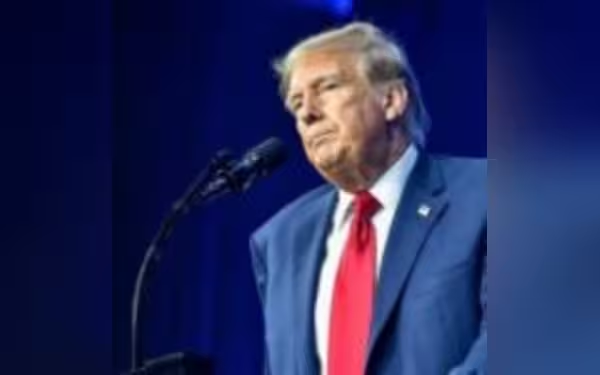Saturday, November 16, 2024 07:38 PM
Trump Escalates 'Enemy Within' Rhetoric Ahead of Election
- Trump labels opponents as 'enemies from within'.
- Concerns raised over military deployment on election day.
- Rhetoric reflects a troubling shift towards authoritarianism.
 Image Credits: pakistantoday
Image Credits: pakistantodayTrump intensifies 'enemy within' rhetoric, raising concerns over military use and election integrity ahead of the upcoming presidential election.
In the lead-up to the US presidential election, former President Donald Trump has intensified his rhetoric, drawing from a playbook often associated with authoritarian leaders. Known for his admiration of dictators around the world, Trump is now focusing on what he describes as the "enemy from within." This phrase has become a hallmark of his political strategy, particularly as he prepares to challenge Vice President Kamala Harris in the upcoming election.
During his presidency, Trump frequently labeled the media as the "enemy of the people," especially targeting outlets that did not present him in a favorable light. As the election approaches, his language has escalated. In a recent interview on Fox News, Trump expressed concerns about potential unrest on election day, suggesting that the US military might need to be deployed to confront what he perceives as internal threats. He stated, "We have some very bad people. We have some sick people, radical left lunatics. And I think they’re the — and it should be very easily handled by — if necessary, by National Guard or, if really necessary, by the military."
Trump's comments raise significant questions about the implications of using military force against American citizens. He identified Democratic congressman Adam Schiff as a specific "enemy," labeling him as a "sleazebag" and a "major lowlife." While Trump would not have the authority to deploy the National Guard or military forces on election day, his rhetoric suggests a troubling shift towards authoritarianism. This is particularly concerning given his history of undermining democratic norms, as seen in his refusal to accept the results of the 2020 election.
As the election nears, Trump continues to cast doubt on the integrity of the electoral process, echoing fears of potential unrest similar to the January 6, 2021, Capitol riot. He has made repeated claims about election fraud, despite a lack of evidence to support these assertions. In a post from September, he declared, "WHEN I WIN, those people that CHEATED will be prosecuted to the fullest extent of the Law, which will include long term prison sentences so that this Depravity of Justice does not happen again." This statement reflects his ongoing narrative that he is the defender of ordinary voters against a so-called "deep state" that he claims is working against them.
In a previous interview, Trump remarked, "sometimes, revenge can be justified," indicating a willingness to pursue punitive measures against those he perceives as adversaries. As the political landscape becomes increasingly polarized, it is essential for voters to critically evaluate the implications of such rhetoric. The use of terms like "enemy from within" can foster division and fear, potentially undermining the very democratic principles that the United States stands for. As citizens prepare to cast their votes, it is crucial to reflect on the importance of unity and the need for a political discourse that promotes understanding rather than hostility.













